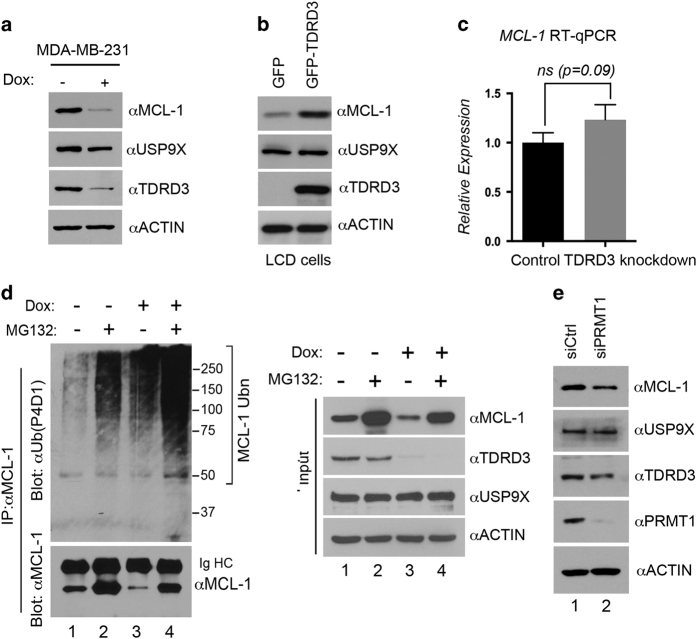Figure 6.
TDRD3 regulates the stability of a USP9X target protein—MCL-1. (a) Reduction of TDRD3 levels destabilizes MCL-1. MDA-MB-231 cells were stably transfected with an inducible shRNA vector targeting TDRD3 mRNA. The cells were either left untreated or treated with doxycycline (Dox) (1 μg ml−1) for 6 days. The protein expression levels were detected by western blotting using anti-MCL-1, anti-USP9X and anti-TDRD3. Anti-ACTIN served as a loading control. (b) The re-expression of TDRD3 stabilizes the MCL-1 protein. LCD cells were stably transfected with GFP or GFP-TDRD3 and the total cell lysates were immunoblotted with anti-MCL-1, anti-USP9X and anti-TDRD3. Anti-ACTIN served as a loading control. (c) The mRNA levels of MCL-1 in MDA-MB-231 cells treated using the conditions described in a were detected by RT-qPCR (quantitative reverse transcription PCR). Error bars represent the s.d. calculated from triplicate qPCR reactions. (d) Reduction of TDRD3 levels promotes MCL-1 ubiquitination. Both control and Dox-inducible TDRD3 shRNA-expressing MDA-MB-231 cells were treated with DMSO or MG132 (10 μm) for 16 h. The cells were lysed in RIPA buffer and IPed with an anti-MCL-1 antibody. The eluted protein samples were detected with anti-ubiquitin (P4D1) and anti-MCL-1 (left panel). The input samples were detected with anti-MCL-1, anti-TDRD3 and anti-USP9X. Anti-ACTIN served as a loading control. (e) Reduction of PRMT1 levels destabilizes MCL-1. MDA-MB-231 cells were transfected with control or PRMT1-specific siRNA. The total cell lysates were detected with anti-MCL-1, anti-USP9X, anti-TDRD3 and anti-PRMT1. Anti-ACTIN served as a loading control.

